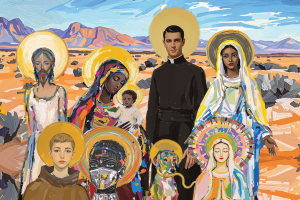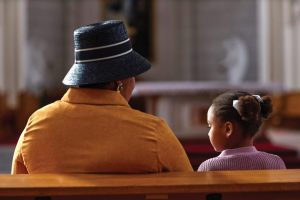Official statements calling gays and lesbians "disordered" and "violent" do little to make them feel welcomed and respected in the church. A pastor argues that it's time to stop the name-calling and start treating gays and lesbians as brothers and sisters in Christ.
I MET LAURA AND LYNNE AT A PARTY GIVEN BY A mutual friend. It was there that I learned they were awaiting word from halfway around the world about a baby available for adoption. A few months later, the two women brought home their new daughter, Chloe.
Soon afterward, they invited me to dinner to discuss a possible Baptism. Lynne, especially, was concerned about whether or not she could have her daughter baptized in a church that was so hostile toward gays and lesbians. It was a good conversation in which we agreed that everything said by church authorities isn’t equal to the gospel of Jesus. A few weeks later, with family and friends gathered, Chloe was baptized.
This new family gingerly made its way back to church. Like many returning Catholics, they weren’t at Mass every Sunday, but often I’d look up and see Chloe and her two moms making their way to a pew. The love they showered on Chloe was evident—love that had begun to undo some of the damage resulting from her isolation in the orphanage. They were just like every other family in their cares and concerns. The only difference was that they were a lesbian couple.
When the Vatican released its letter Considerations Regarding Proposals to Give Legal Recognition to Unions Between Homosexual Persons last year, it stated, “Allowing children to be adopted by persons living in such unions would actually mean doing violence to these children, in the sense that their condition of dependency would be used to place them in an environment that is not conducive to their full human development. This is gravely immoral and in open contradiction to the principle, recognized also in the United Nations Convention on the Rights of the Child, that the best interests of the child, as the weaker and more vulnerable party, are to be the paramount consideration in every case.”
For Lynne, this was the last straw, and Laura agreed. How could they possibly participate in a church that called their love for Chloe “violence” and claimed they were immoral for raising her? As I talked to other gays and lesbians, it became clear many perceived this latest document from Rome as one more in a series of attacks upon their humanity. Their response to the name-calling by bishops wasn’t to respond in kind, but to make a silent and determined resolution to leave the church because they could not tolerate the hatred directed at them anymore.
When I spoke with another priest about this, he told stories of similar reactions. As pastors we were convinced it was not right for the church to alienate so many people on the basis of an orientation over which they had neither choice nor control. Last December we wrote an open letter to the bishops to encourage them to stop treating gays and lesbians as though they were creatures from a different planet and instead sit down and talk with these brothers and sisters in Christ Jesus who were trying so hard to lead good, moral, spiritual lives.
As we made clear in the very beginning of the letter, “We respect the teaching authority of the church.” We were not writing to challenge dogma but to encourage bishops to exercise sound pastoral judgment in the care of these children of God. We stressed, “The life journey in faith is unique and sacred, including the personal integration of sexuality and spirituality. Condemnations leveled at sincere Catholics attempting to make sense out of their journey are inappropriate and pastorally destructive.”
The response to the letter has been both rewarding and disappointing. It is rewarding in that so many people have written to thank us, to tell their stories of feeling outcast and deeply hurt, of trying so desperately to hold on to their faith in the Catholic Church. But we have been disappointed in the limited response from bishops. Our own archbishop, Cardinal Francis George of Chicago, was one that did respond. He wrote, in part, “Your concern that language can make it difficult to welcome people is one I share. The church speaks, in moral and doctrinal issues, a philosophical and theological language in a society that understands, at best, only psychological and political terms. Our language is exact, but it does not help us in welcoming men and women of homosexual orientation. It can seem lacking in respect. This is a pastoral problem and a source of anxiety for me as it is for you. It would be good to discuss it together.”
He went on to remind us that “pastors have to mediate the tension between welcoming people and calling them to change, to repent and convert and live according to Christ’s teaching transmitted by the church. That tension is often resolved in practice by a pastor’s love for his people.”
Which brings us to the crucial question: How can the church be better at “pastoring” its gay and lesbian sons and daughters? I believe this conversation could be helped by following a strategy employed by the members of the Second Vatican Council. Rather than trying to find a way to connect every development in the past two millennia of church history, go back to the source: the gospel of Jesus Christ. Specifically, let both sides use as a common foundation the new commandment of Jesus, “Love one another” (John 13:34). Many gays and lesbians express dismay that their attempts to follow this commandment are met with such hostility, while the bishops express dismay that their teachings, which flow from this commandment, are resisted and even rejected.
As the late Cardinal Joseph Bernardin of Chicago frequently insisted when dealing with groups in apparent opposition, dialogue needs to be entered into with the presumption on each side of the goodwill of the other. Demonizing those who disagree, regardless of the topic, precludes dialogue.
Mutual respect is the necessary starting point. If we can begin with a presumption of goodwill and a foundation in the commandment of Jesus to love one another, three steps might follow to encourage a positive dialogue bringing both sides into closer communion. The first step is for both church leadership and members of the gay community to listen to each other while resisting the urge to speak in moral tones. Beginning with judgment leaves both sides aggrieved and feeling that if they dare to let their guard down for an instant, all will be lost.
Perhaps a sense of hope and direction can be found from the challenge of a younger generation that does not seem overly concerned about either side. Studies of younger Catholics indicate that for the under-30 generation, sexual orientation is not an issue. If we are to offer the next generation any wisdom, perhaps we first have to learn from them and acknowledge that both sides have something to offer and neither has all the answers. If we expect the younger members of our community to listen to us, we must first listen to one another.
The second step is to recognize that there is a lot of pain on both sides. Gays and lesbians feel they have been reduced to less than full human beings whose lived experiences are neither valued nor honored. They point to the language of church documents and episcopal pronouncements when making their case. As Cardinal George said, language is a concern he shares. Because the language of morality and ethics is, by its very nature, judgmental, the church, even if it doesn’t want to be offensive, is perceived as offensive. Another way of speaking must be found that avoids this offense.
The gay community, on the other hand, has become so frustrated in attempting to dialogue with the official church that many members have given up and dismiss the church as having nothing to say in such an important area of life—sexuality. The gay and lesbian community needs to admit that two millennia of church experience and wisdom do have something to offer the discussion. In each recognition, there is an implied request for and granting of forgiveness—a positive and respectful human activity.
The third step is to encourage conversation at the local or parish level. If official statements can make the object of the discussion sound as though they are aliens, the local community or parish knows gays and lesbians as human beings—neighbors, school board members, CCD teachers, store owners, factory workers, and fellow parents of children who share babysitters. The frightening and threatening predictions of certain pundits about the collapse of society if gays and lesbians were to receive equal respect and dignity is not matched with the reality of those who experience gays and lesbians living down the block and fully integrated as members of their families.
It seems generally accepted that asking individuals to live in a state of denial about their sexual orientation is unhealthy and destructive. Such denial is contrary to full human development and the journey toward holiness. The church needs to be a partner with those searching for such holiness.
Cardinal George reminded us that part of our job as pastors is to call people to conversion. Conversion always means change. He is correct in his summons, but it cannot be limited to the gay and lesbian members of our faith community. The church also is always called to conversion. The process I have outlined is one possible strategy for engaging both sides in a conversion process.
Lynne, Laura, and Chloe deserve to have a welcoming church. And the church deserves to have them as members.











Add comment